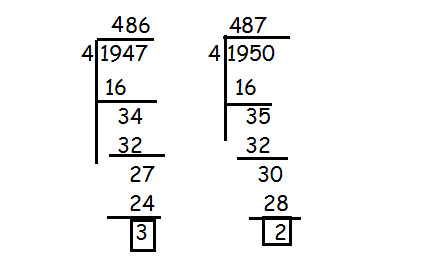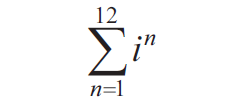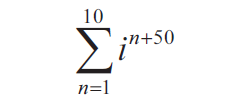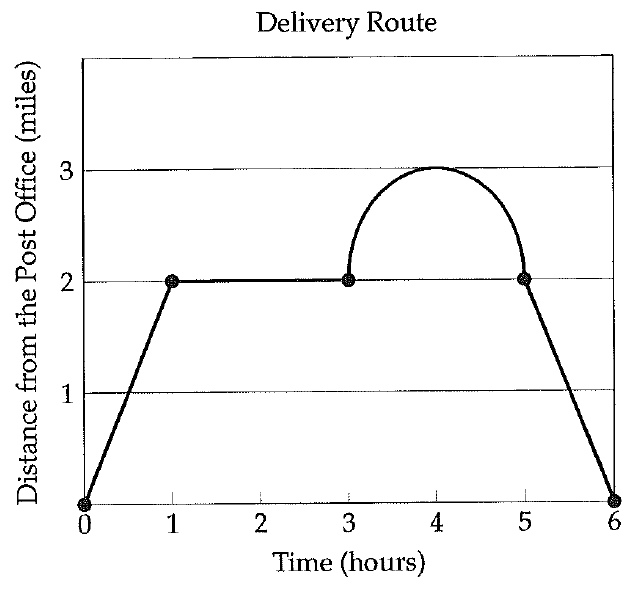EXAMPLE PROBLEMS ON POWERS OF IMAGINARY UNIT I
Value of i to the Power n
For any integer n , in has only four possible values: they correspond to values of n when divided by 4 leave the remainders 0, 1, 2, and 3.
That is when the integer n ≤ −4 or n ≥0 4 , using division algorithm, n can be written as n = 4q + k, 0 k < 4, k and q are integers and we write
|
Remainder by dividing the exponent by 4 |
Value of the given exponent |
|
0 1 2 3 |
1 i -1 -i |
Question 1 :
Simplify the following :
i1947 + i1950
Solution :

i1947
By dividing 1947 by 4, we get the remainder 3.
So, the value of i1947 is -i
i 1950
By dividing 1950 by 4, we get the remainder 2.
So, the value of i1950 is -1
i1947 + i 1950 = -i - 1
i1947 + i 1950 = -i - 1
Question 2 :
Simplify the following :
i1948 - i-1869
Solution :

i1948 - i-1869 = 1 - (1/i)
= [(i - 1)/i] [i/i]
= (i2 - i)/i2
= (-1 - i)/(-1)
= 1 + i
Question 3 :
Simplify the following :

Solution :
If n = 1, then in = i1 = i
If n = 2, then in = i2 = -1
If n = 3, then in = i3 = i
If = 4, then in = i4 = 1
= i + i2 + i3 + i4 + ...................... + i12
= (i - 1 + i + 1) + ...................... + i12
The above series will have 12 elements, it can be divided into three equal groups.
Each group will contain the above four elements. Hence the answer is 0.
Question 4 :
Simplify the following :
i59 + (1/i59)
Solution :
= i59 + (1/i59)
By dividing 59 by 4, we get 3 as remainder.
= -i + (1/(-i))
= -i - (1/i)
= -i2 - 1
= -(-1) - 1
= 1 - 1
= 0
Question 5 :
Simplify the following :
i i2 i3 .............i2000
Solution :
i i2 i3 .............i2000
= i (1 + 2 + 3 +..............+ 2000)
= i (1 + 2 + 3 +..............+ 2000)
n = 2000, a = 1, Sn = (n/2)[a + l]
S2000 = (2000/2) [1 + 2000]
= 1000 [2001]
= 2001000
= i 2001000
The power is 2001000 is exactly divisible by 4, we get 0 as remainder.
Hence the answer is 1.
Question 6 :
Simplify the following :

Solution :
If n = 1, then in + 50 = i51
If n = 2 , then in + 50 = i52..........
If n = 10 , then in + 50 = i60
= i51 + i52+ i53 + ............... + + i60
= i51 [1 + i + i2 + i3 + i4 + i5 + i6 + i7 + i8 + i9 + i10]
By grouping the first and the next four terms, we get 0.
= -i [i - 1]
= -i2 + i
= 1 + i
Kindly mail your feedback to v4formath@gmail.com
We always appreciate your feedback.
©All rights reserved. onlinemath4all.com
Recent Articles
-
AP Calculus AB Problems with Solutions (Part - 8)
Jan 30, 25 09:48 AM
AP Calculus AB Problems with Solutions (Part - 8) -
SAT Math Resources (Videos, Concepts, Worksheets and More)
Jan 29, 25 06:00 AM
SAT Math Resources (Videos, Concepts, Worksheets and More) -
Digital SAT Math Problems and Solutions (Part - 105)
Jan 29, 25 05:52 AM
Digital SAT Math Problems and Solutions (Part - 105)
